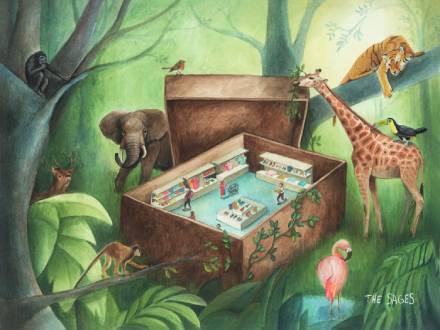Can one be a capitalist without knowing it?

In the fashion sector, the major industrial groups make the consumers believe that they are individually important for them, establishing a relation of trust and a feeling of unconscious affection that encourages them to buy the goods. These accumulated purchases have led to the establishment of a global oligopoly within a superpower of multinationals. By handing power to the industrial groups, the citizens have prevented themselves from taking the initiative. Small shops are closing down, firms are consolidated as each company buys out others, and this has resulted in a world of extreme hierarchies and profitability.
This type of consumption is completely outdated and its roots go back to the 1990s and 2000s, when the goal was to overproduce in order to sell more for a cheap price and to encourage the consumers to change clothes as often as possible. To counter this mentality, we first need to re-establish the value of money.
Consumerism also changes our relation with money. The more our society revolves around consumption, the more money becomes central, as it is necessary for our purchases. we are increasingly opting for careers based on potential earnings. No lifestyle choice is spared, and even relationships are affected: according to a study carried out by the Chapman University (California), financial criteria are an essential factor in the choice of a partner for 97% of women and 74% of men.
In other words, consumerism takes priority over an individual’s values, personal aspirations, sensitivity, and talents. Today, the main political demand, supported by unions and anti-capitalist parties, is the lack of purchasing power. Yet, it is this very purchasing power that preserves and protects the rise of unbridled capitalism and enslaves those who sustain this system via their consumption or by agreeing to work for multinationals that in reality exploit, manipulate, and destroy. Human beings consume in order to feel free and have the impression that they are in charge of their lives and desires, but in reality, people overconsume to compensate for their lack of freedom.
It is important to realise that the need to buy is not a conscious act. It is calculated by researchers and computers, to ensure that human beings respond in a highly predictable way to marketing. Sweets are red because marketers know that children prefer the colour red. Prices often display the number ‘9’ because our brain reacts more favourably to a ‘9’than an ‘8’. Shopping centres have their entrances on the right rather than on the left because people first look to the right and then to the left. Music, found in all commercials and even on certain television news programmes, alters perceptual emotions. Major companies take hundreds of factors into account to encourage the customers to walk in and buy as much as possible. Nothing is left to chance. Advertisements are filled with images of happy people and animals, even though they are the real victims of a form of consumption dictated by industrial groups that multiplies profits at the expense of their customers.
Today, we need to enter a new phase, by decreasing production and increasing the use of sustainable materials, as well as decreasing overall consumption. Being instead of having.
‘Only when the last tree has died and the last river has been poisoned and the last fish has been caught will the white man realise he cannot eat money’
NO LIFESTYLE CHOICE IS SPARED, AND EVEN RELATIONSHIPS ARE AFFECTED: ACCORDING TO A STUDY CARRIED OUT BY THE CHAPMAN UNIVERSITY (CALIFORNIA), FINANCIAL CRITERIA ARE AN ESSENTIAL FACTOR IN THE CHOICE OF A PARTNER FOR 97% OF WOMEN AND 74% OF MEN.



Validate your login